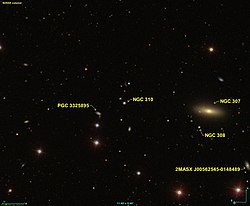| Observation data Epoch J2000.0 Equinox J2000.0 (ICRS) | |
|---|---|
| Constellation | Cetus |
| Right ascension | 00h 56m 48.0s [1] |
| Declination | −01° 45′ 57″ [1] |
| Apparent magnitude (V) | 14.6 |
| Other designations | |
| PGC 3396 [1] | |

NGC 310 is a star located in the constellation Cetus. It was recorded on December 31, 1866, by Robert Ball. [2]